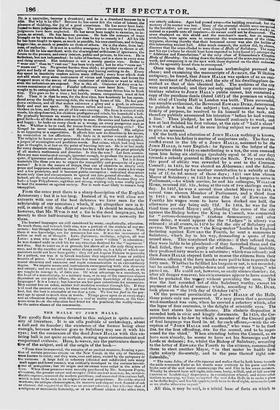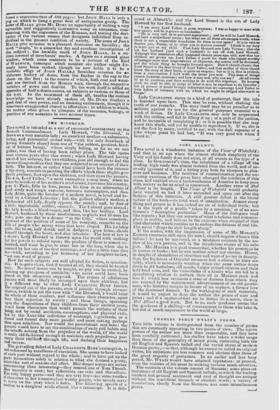THE HALLE OTI JOHN HALLE.
THE goodly first volume devoted to this subject is quite a curio- sity of literature. It is an olla podrida of archteology, about a hall and its founder; the existence of the former being clear enough, because whoever goes to Salisbury may see it with his eyes ; but the connexion of the dead JOHN HALLE with this ex- isting hall is not quite so certain, resting upon circumstantial and conjectural evidence. Here, however, are the particulars descrip- tive of the subject, and of the origin of the book— "From time immemorial, the remains of an ancient mansion, forming a por- tion of certain premises situate on the New Canal, in the city of Salisbury, were known to exist; and they were, ever and anon, visited by the antiquary or the virtuoso. A large hall or refectory (divided and subdivided into many mall upper and lower rooms), was evidently developed to the curious investi- gator of antiquities ; but its origin and its owner were veiled in the mists of tante. When these premises were recently purchased by 51r. Sampson Payne, chinaman, the present owner arid occupier of this ancieut mansion, he, at consi- derable expense, removed the modern partitions, and renovated this curious hall, which is now to be seen in its original size and proportions. Its richly-storied window'', its antique cliimeeypieee, its massive and elegant tool, framed of oak or chermat, did suggest that this oas an am:tem refectory; but n lather that of a religious or mercantile fraternity, or of an affluent citizen of the olden time, was utterly unkown. Ages had passed away—this building remained, bat the memory of its master was lost. Many of the armorial shields were recognize/1 by the heraldiet; yet one coat of arms (impaled with a merchant's mark) re. mained as a puzzle unto all inquirers—its owner could not be discovered. The arms displayed on this shield and the merchant's mark, but on separate scutcheons, were again seen to ornament the transome-stone of the chime, neypiece, showing thereby that their honoured owner was also the builder of this interesting ancient hill. After much research, the author did, by chance. discover that the arms alluded to were those of Hulk of Salisbury. The name" Met his eye (where he should least have expected to have found it) amongst 04 " Additions and Emendations," at the very close of Edmondson's Complete Body of Heraldry. On taking down the description of the arms asgiven in that wotk, and comparing it on the spot with those depicted on the then unknown shield, he agreeably found them to correspond."
Once upon the track, our zealous archteologist pursued the chase; and examining the manuscripts of AUBREY, the Wiltshire antiquary, he found, that JOHN HALLE was spoken of as an mi. nent merchant of Salisbury, and the site of his dwellingplace de- scribed as that of this identical hall. The archives of the city. were next searched; and they not only supplied very curious par.. ticulars relative to JOHN HALL'S public career, but contained a copy of the purchase-deeds (dated 1467) of the premises on which, this rival of Crosby Hall in London was built. Thus successful,. our amiable enthusiast, the Reverend EDWARD Dtatx, determined, to publish a book on the subject ; but, conscious of man's in- firmity- of purpose, he resolved to fix himself to the task, anti therefore publicly announced his intention "before be bad written a line." Thus pledged, he set himself zealously to work, and has at last finished his first volume, at the rate of " half a sheet" a week: of which, and of its once living subject we now proceed to give an account.
Of the birth and education of JOHN HALLE nothing is known,
and who was his father is matter of conjecture only. The first re.
cordbd event in the life of a JOHN HALLE, assumed to be the JOHN HALLE, is very English : he figures in the ledger of' the
Corporation (date 1444) as contributing to a tax, the sum assessed upon him being six shillings (probably equal to 3/. of our day)
towards a subsidy granted to HENRY the Sixth. Two years after, this proof of ability was rewarded by a seat in the Common Council ; in 1448, he was elected an Alderman ; and the follow- ing year, touched up for another contribution to a subsidy at the rate of 1/. 68. 8d. motley of those days ; 1451 saw him chosen Mayor of Salisbury ; in 1453 he was elected a burgess to serve in Parliament, —for which service, he and his colleague, Wrest tat HORE, received 32/. 12s., being at the rate of two shillings each a day. In 1457, be was a second time elected Mayor; in 1460, a second time chosen Member of Parliament, and a third time in 1461 ; on which last occasion (the 1st of EDWARD the Fourth) his wages seem to have been docked one half, the allowance per day being only 12d. In 1464, he was for the third time elected Mayor; and, pleading the cause of the city against the Bishop before the King in Council, was committed for " rottous-demeanynge " (riotous demeanour); and after some delay, it would appear (for the "Ledger" is silent) was released : at all events, in 1470 be did the city of Salisbury good service. When WARWICK" the King-maker" landed in England declaring against EDWARD the Fourth, he sent a summons to Salisbury, which lay in his way, demanding a quota of forty armed men. This nonplused the citizens : if they refused them, they were liable to be plundered—if they furnished them and the Earl failed, they were guilty of rebellion. Pleading inability, they proffered forty marks as a substitute ; which was refused; and then JOHN HALLE stepped forth to rescue the citizens from their dilemma, offering if the forty marks were paid to him to provide the forty men. Whether he fulfilled his bargain or not, is not recorded; but he satisfied " the puller-down and setter-up of kings," who passed on. He could not, however, so easily silence slander; for, after all danger was over, his civic enemies appear to have asserted that be pocketed the mglitey without providing the men. This was the last recorded het of this Salisbury worthy, except his payment of the debt of nature ; which, according to Mr. DUKE, took place on " the 18th day of October 1479." Of the personal peculiarities of JOHN HALLE of the Halle, three points only are preserved. We may guess that a provincial wool-merchant was vain, when he erected a refectory which, after the lapse of four centuries, is the delight of scientific eyes. The same fact shows his munificence. His choleric disposition is recorded both in civic and kingly documents. In 1458, the Cots poration made a by-law by which a member of the Council guilty of foul language was fined 38. 9d. for each offence,—with the ex• ception of "JOHN HALLE and another," who were "to be fined 200. for the first offending, 408. for the second, and to be impri- soned for the third." When attending before the Council, as we have seen already, he seems to have set his Sovereign and the Lords at defiance; for, whilst the Bishop of Salisbury, according to the letter of EDWARD the Fourth to the citizens, commanding them to elect another Mayor, " in that muter be hadde hym right soberly dis-cretely, and to the peas thereof right eon- formablie," " The same John, of the oble rancour and malice that he hath borne towards the eaide reverende Fader as hit shulde acme contrary to his parte and date, brake outs of the eat mater coucernynge the acid Cite in his owen mateiers. Wherby be sbewed hyna self-right, cedicious, hasty, wilful!, and of full unwitty (unwise or headstroug) disposicon ; in consideracon wheruf, and divers other matiers us movyng, we have co'mytted the seid John Halle in to niche a place as he sheltie kepte, and has hit apperteyneth to us to do of right, unto mac tyme as we shalbe otherwise avysetl."
All this, it may be said, is a trivial base of facts on which to
found a superstructure of 600 pages: but JOHN HALL is only a peg on which to hang a great deal of antiquarian gossip. The name of HALLE gives Mr. Dom an opportunity of writing a very agreeable and suggestively Instructive essay on surnames, com- mencing with the cognomen of the Romans, and tracing the den. yahoo of the various names that designate individual from in- dividual in the present condition of society. The arms of JOHN HALLE give occasion to a pleasant discussion on heraldry ; the word "staple," to a somewhat dry and overdone investigation of the subject ; the heraldic mark of JOHN HALLE, to a cu- rious account of merchants' marks. A figure on a stained glass window, which some maintain to be a portrait of the Earl of WARWICK, (amongst which number our author might for- merly have been ranked, though he now holds it to be a veritable effigy of' JOHN HALLE,) furnishes occasion for an elaborate history of dress, from the feather in the cap to the skoon on the feet ; in the course of which, both coat and waist- coat are derived from the Roman toga, through the respective varieties of gown and doublet. To the work itself is added an appendix of half -a-dozen essays, on subjects as various as those of the text. In the treatment of them all, besides the curious knowledge we have already spoken of, Mr. DUKE displays a good deal of easy power, and an amusing enthusiasm, though it is sometimes exaggerated almost to affectation : in addition to which, his matter often gives us glimpses of the manners, feelings, or practices of our ancestors in very ancient times.



























 Previous page
Previous page